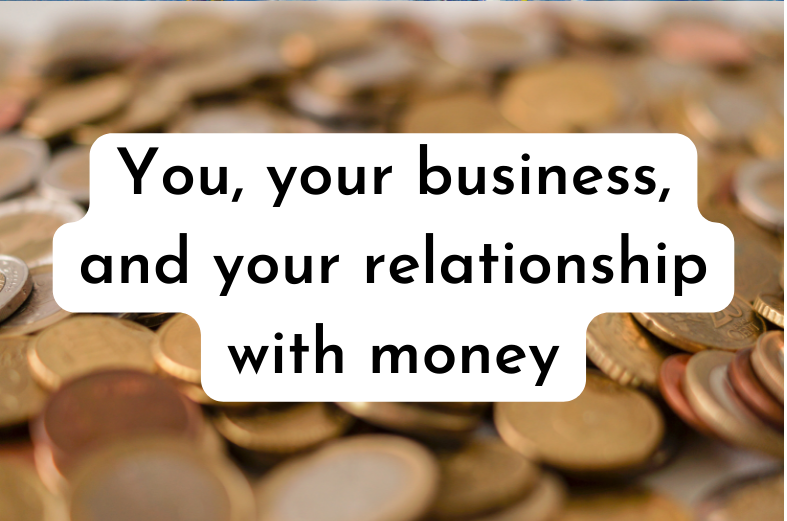
For a lot of us, if our relationship with money was in a Facebook profile, it would be set to ‘It’s Complicated’.
It’s one of the hardest things in business to get to grips with – the difference between revenue and profit, the cashflow, provisioning, drawings, paying yourself, investing, setting your fees and prices, and knowing your worth.
How’s your relationship with money?
Just like in human relationships, we can have a healthy or an unhealthy relationship with money, and that relationship is often rooted in our formative years. We copy what we see the adults in our life do. A healthy relationship with money means spending what you need to, saving as much as you can, and feeling secure in the knowledge that it’s a renewable resource. You’re comfortable looking at your balances and keeping track of things, and importantly you don’t let those numbers define your worth as a person.
An unhealthy relationship with money can take a lot of forms. It can involve spending everything and freaking out at tax time (the downfall of many a small business), it can involve burying your head in the sand and not keeping track of your finances, it can be a scarcity mentality with money that means you never invest anything back in your business, or that you never pay yourself anything, and it can be not charging enough and not following up invoices because you give the money power over your worth.
You can change your relationship with money
Just because you’ve learned to interact with money in one way, doesn’t mean you can’t change that. Ask yourself a few questions.
How does money make you feel now? How does it feel come tax time? Are you well prepared, or does the thought of finding thousands to give the IRD make you anxious? How does it feel to buy groceries? To buy yourself treats? To invest in business equipment? These will give you clues about your relationship with money.
What does a healthy relationship with money look like to you? Do you feel relaxed about spending on yourself and your business? Are you comfortable with your cashflow? Are you confident asking for more from a client whose scope is creeping, and chasing up unpaid debts?
What are the unhealthy things you do around money? Do you have low self-esteem comparing yourself to others who you think make more than you? Do you think your business is inherently unsuccessful because you haven’t met X income goal? Do you spend impulsively? Do you keep old, inefficient software and devices for too long because you don’t want to pay to replace them?
What would you like to do instead? Would you like to set a professional development budget? Save to upgrade some equipment? Keep on top of cashflow better? Think about what practices you could adopt that make you feel better around money.
Then it’s time to set yourself a plan! Look at where you want to be, money-wise. Then you can backtrack to set small, realistic milestones along the way.
Don’t forget yourself
Do you find that paying yourself is an afterthought, or that it’s a ‘treat’ only if you’ve made enough for everything else?
That’s possibly the number one thing that small business owners do, and I’d like you to stop it if possible, please.
Repeat after me: your salary/earnings are a legitimate business expense, like everything else. And you deserve to be paid fairly for the work you do.
I really like the ‘Profit First’ idea, from Mike Michalowicz’s book, where you essentially decide how much you want to make and put that aside first. Then you make your other expenses fit around that. Tax is non-negotiable, so always provision a portion for that. But are there other expenses you can cut? A cheaper phone plan? A paid subscription when you hardly use any of the features? I really recommend checking out this book and these ideas.
What else?
Money is a huge topic, way too much to cover in one blog post. It’s super-sensitive and individual for most of us, because we value different things and we grew up around different money models. For me, I get confused around when to pay someone to do something, or do it myself – my dad was always ‘throw money at a problem to make it go away’, and my mum was the opposite! Then the decision comes down to opportunity cost – if I do this myself, what am I not doing instead?
There’s no doubt that making fiscally responsible decisions is a cornerstone of business ownership – and for a lot of creatives, it’s not second-nature. But I hope that I’ve given you a few things to think about.
Above all, remember: your money is not you. Your money is abstract and it’s just some numbers on a computer screen. How big those numbers are says nothing about you, but to a large extent they’re very much in your control (even if it doesn’t feel that way sometimes).
Is this something you want to know more about?